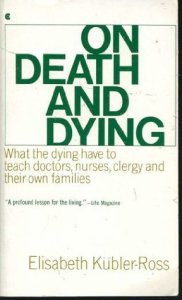
“There is not much sense in suffering, since drugs can be given for pain, itching, and other discomforts. The belief has long died that suffering here on earth will be rewarded in heaven. Suffering has lost its meaning.” Elisabeth Kübler-Ross
When Elisabeth Kübler-Ross wrote this in her groundbreaking 1969 book, On Death and Dying, she was, of course speaking of the patient, the person dying. In the book, she famously describes the “stages” the terminally ill patient goes through: Denial, Anger, Bargaining, Depression, Acceptance. The book was not meant to be considered a research study, a point she repeatedly makes. She also emphasizes that these stages may be skipped, occur concurrently or be returned to on the way to Acceptance. And yet we suffer. We all suffer.
As I watch my wife go through this process, I cannot help but realize how similar the process is for the caregiver, the family members, and the survivors. We, too, are passing back, through, over, and around these stages in our effort to understand what is happening to our loved one. My initial Denial and Anger had given way to Bargaining (“this is our new normal, we’ll take as much time as we can get”), when on any given day, I can slip easily into Depression and back to Anger only to wake up the next day after a dream in Denial. No seatbelt or ABS brake can prevent that whiplash.
I cannot imagine a day when I have reached Acceptance because Kübler-Ross also wrote:
“The reality is that you will grieve forever. You will not ‘get over’ the loss of a loved one; you will learn to live with it. You will heal and you will rebuild yourself around the loss you have suffered. You will be whole again but you will never be the same. Nor should you be the same nor would you want to.”
Am I grieving already? Yes. Am I confusing the “stages” and grieving? Perhaps. All I know is that each day (and often times several times within a day) brings a new emotion for which I am unprepared, I thought I had made peace with, or I anticipated would bring me peace, only to find myself confused and lost again. And one of the worst emotions I carry is that I know that while I am suffering the whiplash of these stages, I am not the one dying, I am not the one suffering or actually going through Kübler-Ross’s stages of the terminally ill. As she also wrote, “Guilt is perhaps the most painful companion of death.” Suffering has lost its meaning because we all still suffer.
